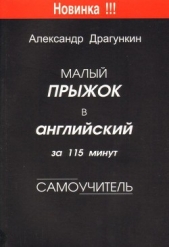Практическая грамматика английского языка

Практическая грамматика английского языка читать книгу онлайн
Внимание! Книга может содержать контент только для совершеннолетних. Для несовершеннолетних чтение данного контента СТРОГО ЗАПРЕЩЕНО! Если в книге присутствует наличие пропаганды ЛГБТ и другого, запрещенного контента - просьба написать на почту [email protected] для удаления материала
to drive a wedge between smb. ( вбивать клин между кем-либо и кем-либо:
I'm not driving a wedge between you. ( Я вовсе не пытаюсь вбить клин между вами.
such a turn of events ( такой поворот событий:
She could well imagine his reaction to such a turn of events. ( Она могла хорошо представить себе его реакцию на такой поворот событий.
to hold oneself in check ( сдерживаться:
She held herself in check, though she longed to run to him. ( Она сдерживала себя, хотя ей очень хотелось броситься к нему.
to have the blues ( хандрить:
You've got the blues - that's what's wrong with you. ( Ha тебя нашла хандра - вот что с тобой.
to count / not to count ( иметь значение / не иметь значения:
Where you live doesn't count, or how you dress. ( Где ты живешь и как одеваешься, значения не имеет.
every minute counts. ( каждая минута дорога.
to have the knack of smth. / for doing smth. ( научиться чему-либо / уметь делать что-либо:
At first he was awkward, but soon he had the knack of it. ( Поначалу у него не очень получалось, но вскоре он научился этому.
Are you sure your sister has the knack for baby-sitting? ( А ты уверен, что твоя сестра может смотреть за ребенком?
to scare smb. out of smb.'s wits ( напугать кого-либо до смерти:
First he scared me out of my wits - then he yelled when I tried to help him. ( Сначала он до смерти напугал меня, а потом начал кричать, когда я попыталась помочь ему.
to be in the habit of doing smth. ( иметь привычку делать что-либо:
Не is not in the habit of waiting for me. ( У него нет привычки ждать меня.
to get into the habit ( заиметь привычку / привыкнуть:
Soon he got into the habit of bathing and shaving in the morning. ( Скоро он привык принимать по утрам ванну и бриться.
to be a natural born smth. ( быть прирожденным кем-либо:
That's because I'm just a natural born driver. ( Это потому, что я прирожденный водитель.
to be out of the question ( не вызывать (никаких) сомнений:
The only man I can live with is you, and that is out of the question. ( Единственный мужчина, с которым я могу жить - ты, и это не вызывает сомнений.
to do smb. disservice ( оказать кому-либо медвежью услугу:
We must consider his welfare above ours or we might do him some great disservice. ( Мы должны ставить его благосостояние выше нашего, иначе мы можем оказать ему медвежью услугу.
to have nothing to do with smb. / smth. ( не иметь никакого отношения к кому-либо / чему-либо:
His belongings have nothing to do with me. ( Его вещи не имеют ко мне никакого отношения. / Я не имею никакого отношения к его вещам.
to put an entirely different light on the matter ( представлять все совершенно в ином свете:
The remark about her father suddenly put an entirely different light on that matter. ( Замечание относительно ее отца вдруг представило все дело совершенно в ином свете.
to stand smb. in good stead ( сослужить кому-либо хорошую службу:
His facility with languages other than his own had stood him in good stead in the past.( Его владение иностранными языками сослужило ему хорошую службу в прошлом.
My car has stood me in good stead this winter. ( Моя машина хорошо послужила мне этой зимой.
to feel smth. in one's bones ( чувствовать сердцем:
It is the very truth, I feel it in my bones. ( Чует мое сердце - это чистая правда.
to be a long way from smth. yet ( быть еще далеко не ...:
I'm a long way from poor yet.( Я еще далеко не бедняк.
to be booked (up) ( быть полностью занятым (не иметь времени):
I'm booked (up) on Wednesday. ( Я полностью занят в среду.
37. Некоторые наиболее распространенные редуцированные / искаженные формы, характерные для разговорной речи низкого уровня.
ain't ( am not / is not / are not / have not / has not
I ain't going there. ( Я не пойду туда.
We ain't got money. ( У нас нет денег.
ain'tcha ( ain't you;
a'bin ( have been;
an' ( and;
anyways ( anyway;
'ave / 've / 'a ( have;
'appen ( happen; 'ere ( here; 'ome ( home; 'e ( he; 'ow ( how;
awys ( orluss ( always;
a ( o' ( of;
can'tcha ( can't you;
coulda ( could have;
coupla ( couple of;
c'mon ( come on;
don'tcha ( don't you;
didja ( did you;
fella ( fellow;
fost ( first; wok ( work;
g'night ( good night;
gimme ( give me;
g'by ( good by;
gerrup ( get up;
gerraway ( get away;
gon'ta ( gonna ( to be going to:
You gonna stay here long? ( Ты собираешься долго пробыть здесь? / Ты будешь здесь долго?
gotta ( have got to;
hadda ( had to;
hellya ( hell do you;
heah ( here;
helluva ( hell of a;
. how'bout ( how about;
inna ( mto;
jes' ( just;
leggo ( let go;
lemme ( let me;
les's see ( let us see;
letcha ( let you;
me ( my:
me car / me house / ...
mek ( make; tek ( take;
'member ( remember;
mistah ( mister;
musta ( must have;
'n' ( than;
noa ( nope ( naw ( no;
on'y ( only;
oughta ( ought to;
outa ( out of;
orright ( all right; gerron ( get on;
sonuvabitch ( son of a bitch;
so's ( so as;
'sail right ( it's all right;
s'pose ( suppose;
shuah ( sure;
shurrup ( shut up;
speaka ( speak to; talka ( talk to;
tha' ( that;
they's ( there is;
tomorra ( tomorrow;
t'day ( today;
toucha ( touch; puncha ( punch:
You toucha my car. I puncha your nose. ( Дотронешься до машины, получишь в нос.
twenny ( twenty;
thirdy ( thirty;
toleja ( told you;
tellya ( tell you;
usta ( used to;
wanta ( wanna ( want to;
wi' ( with;
wun't ( won't;
whenja ( when did you;
wudja ( what do you /what did you;
willya ( will you;
wuddaya ( what do you;
ya / ye ( you / your;
yeah / yeap ( yes.
Пример английской искаженной речи низкого уровня:
- Who the' dell are yet An' why ye brung me 'ere? ( Who the devil are you? And why did you bring me here?
- I want to ask you some questions and I want truthful answers. Now, tell me what happened just before the ship sank.
- Weel, I tell ye, it wam't much different from any other cross-ing, 'cepting it were a rough sea. ( Well, I'll tell you. It was not much different from any other crossing, except it was a rough sea.
- Was there a fire on board?
- Jes' a wee one in one o' the topsails. Warn't none on deck 'til she blew. Then they 'us fire everywhere. ( Just a weak one in one of the topsails. Was not any on deck until she blew. Then there was fire everywhere.
- What was in the hold?
- Gunpowder, a 'course. Helped load 'er meself. 'Ope 'e rots in 'ell who lit it. ( Gunpowder, of course. I helped to load her myself. I hope he'll rot in hell who lit it.
Раздел VI.Основные способы образования слов в английском языке.
Многие слова в английском языке относятся к разным частям речи, хотя абсолютно ничем не отличаются в произношении / написании:
like ( нравиться
like ( похожий
Некоторые слова относятся к разным частям речи и различаются по произношению (чаще всего ударением), хотя в написании никаких различии нет:
present ( присутствующий
present ( подарок
present ( дарить
В некоторых случаях существительное отличается, от соответствующего ему глагола произношением последнего согласного звука (у существительных - глухой, у глаголов - звонкий). При этом могут происходить небольшие изменения в написании слова:
use [ju:s] - to use [ju:z]
bath - to bathe
breath - to breathe и др. - см. Словарь






















